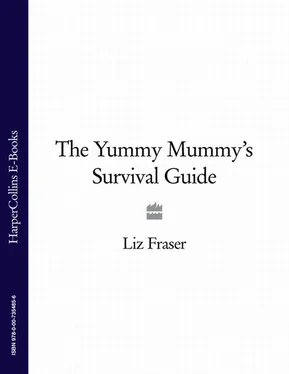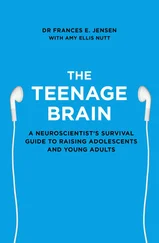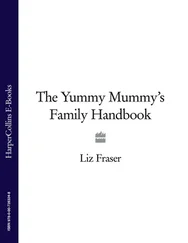When you are pregnant, you will get bigger. It’s mainly just your stomach and breast regions which will go a little crazy, and to be honest that’s hardly very surprising: there’s a person growing inside you, and it’s got to go somewhere. Unless you have some really weird internal arrangements, like no vital organs at all, then the only way is outwards, hence the big tummy.
And the breasts thing is fantastic! Even the flattest of flatties develop heaving bosoms worthy of a Merchant Ivory production. Any man (or woman) who has cause to be fumbling around the region will be delighted with your new arrivals. Embrace these new curves: flaunt them, feel them and enjoy every inch, because when the breast-feeding is over, so are the breasts. Gone!
Anyway, so far, ‘bigger’ is OK. It’s a good kind of bigger. The trouble starts when you feel you have to eat enough to feed your growing baby as though it’s running a marathon in there or something. It’s not. It’s just hanging around, swallowing, stretching, sucking its thumb occasionally, and growing a teeny bit. Hardly enough to merit a full extra meal, if you’re honest.
‘ But it needs to grow—I must eat more! ’, you will cry, washing down another granola bar with a full-fat latte before polishing off your husband’s pain au chocolat and wondering if just one more doughnut before lunch might be in order. This is absolutely fine, if you don’t mind turning into a bus. It’s not fine if you want to recognise yourself in a few months’ time.
WARNING!!:This strong sense of having to eat tons more than usual is reinforced by absolutely everyone you know telling you to, and tirelessly offering you calorie-laden nourishment, which you would never normally have (honest). Resist! Resist! This goes doubly for your parents, and about ten-fold for any in-laws you may have acquired. Only visit these well-meaning people if you are armed with either a will of iron strong enough to decline their barrage of offerings, or a paper bag to pop any unwanted but forced-upon-you food into for future disposal. It sounds awful, but these desperate times can call for desperate measures. The alternative is just saying ‘No, thank you’ the whole time, which becomes very boring, and makes your mother-in-law think you hate her. Bad plan.
But I’m eating for two
No, you are not , or at least not in the way that it implies. ‘Eating for two’ makes it sound like you should be packing in two times the amount of food you would normally eat, or at least something approaching it. If you do that, as everyone from your second-best friend (your best friend will know better) to your favourite barista will do their damnedest to encourage, you will, as you so fear, become enormous!
‘Eating for two’ became my most hated phrase when I was pregnant (apart from ‘Oh, I had twins, too.’ I’ve never had twins, just huge bumps, apparently).
OK, so how much am I supposed to eat when I’m pregnant?
This is an impossible question to answer, but I can tell you what worked for me , and you can decide if you want to give it a go. Everyone is different, everyone wants different things, and I am NOT saying that this is medically or universally the best way to approach things, so please leave the lawyers out of it.
For me it was a simple question of maths.I am 1.7 metres tall and I normally weigh about 50 kgs. At twelve-weeks gestation a foetus is, depending on which book you decide to believe, about 6cm long and weighs roughly 18g. Grabbing a pocket calculator for a second, I calculate that this made my three-month-old unborn baby about 3.5% of my height, and only 0.36% of my weight.
So at this stage, going by our relative weights, it was more a case of eating for 1.0036 than for 2. Looking at a typical day’s food, that’s probably not much more than a few extra grains of rice, and maybe a couple of grapes.
Not two Danish pastries, a mozzarella panini and a steak tartare, then? Errrr, no.
Even at full term, when it is ready to be born, a baby is generally about 35 cms long and weighs on average 3.5kgs. That’s still only 7% of my normal body weight. In food terms, I make that one extra potato and a chicken wing, at the most.
Can a baby really grow big enough that way?
Babies do whatever Mother Nature has in mind for them. Most just seem to grow as big as their genetic make-up tells them to, and there seems to be little correlation between the amount Mummy eats and the size of her baby. I’ve known big ladies produce tiny babies, and skinny ladies give birth to whoppers. Que serra, serra .
Using my very own geeky, logical approach, I managed to produce two 9 lb babies (which to you and me just means ‘ridiculously big’), and one 8 lb baby. I didn’t put on more than a kilo or two besides baby weight with any of my kids, and most of this was to be found in my maternity bra. I breast-fed all of them without any trouble at all, and so far they seem to be very strong and healthy children.
Now, before you padlock the larder…
Other Factors to Take Into Account (which mean you should up the food-intake)
Your increased blood volume, higher metabolism and just general extra effort required to haul yourself around all mean you should probably increase what you eat by slightly more than I’ve shown above. But the general point remains the same: becoming pregnant doesn’t mean you have to eat tons more. Just a little extra healthy food will do wonders.
Obviously, if you have any concerns, then go and talk to your doctor or midwife about them. At the end of the day, or rather nine months, it’s your baby, and your body. If you do what feels right for both of you, you will always know that you did your best. If you don’t mind putting on a bit of weight, then go for it! Being pregnant was the first time I enjoyed feeling rounder and more curvy, and it was (eventually) a very sexy feeling. But if you’d rather keep the weight gain to a minimum, then try not to eat much more than normal. As long as it’s a balanced diet with all the food groups in it, you and your baby will probably both be just fine.
Body Image and Eating Problems
Here’s an indisputable fact: lots of women have eating problems. Millions of us. I can hardly think of a single friend between the ages of twenty and sixty who hasn’t had, or doesn’t still have, some kind of hang-up about food and eating, and that’s not because I hang around neurotic, anorexic, food-obsessed people. Almost everyone has food issues these days, and pregnant women are no exception.
We may like to think , or hope, that becoming a mother somehow changes our attitudes to life, our priorities and our self-image, but in fact it often does nothing of the sort. Just because you have a baby to think about does not automatically mean you suddenly stop caring about the size of your bum, the wobbliness of your thighs or how much carbohydrate you consume. Nor should you expect it to, or worry if it doesn’t.
If you are one of the lucky, confident types who loves her body in whatever form, then I take my hat off to you. If, like me and most of my friends, you have a fairly changeable body image and have been through periods of being underweight, overweight or just-not-the-weight-you-want weight, then you will probably continue this way throughout your pregnancy. Some women get a little worse, and some women get a little better as they learn to relax about their bodies.
One thing I have discovered is that pregnancy can be the start of food problems for many women because it changes your body shape out of all recognition very quickly, you suddenly become aware of lots of parts of your body you had never paid much attention to before, and it requires you to think about what you do and don’t eat the whole time. Once you’ve had the baby you might start to lose some of the weight gained, but this pursuit can become addictive, which is why you may have seen pictures of previously gorgeous, curvy girls suddenly looking like skeletons within a year of their baby being born. It’s very sad, but it’s not uncommon.
Читать дальше












